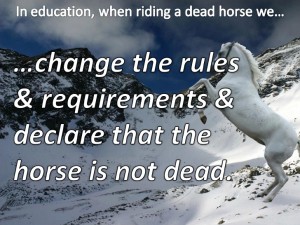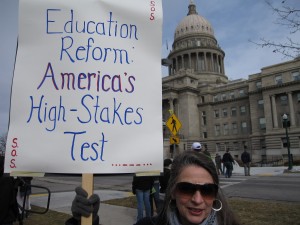The following story was anonymously left in the mailbox of Dr. Emory Cowen of the University of Rochester and relayed to us through Dr. Seymour Sarason:
Common advice from knowledgeable horse trainers includes the adage, “If the horse you’re riding dies, get off.” Seems simple enough, yet, in the education business we don’t always follow that advice. Instead, we often choose from an array of alternatives which include:
1. Buying a stronger whip.
2. Trying a new bit or bridle.
3. Switching riders.
4. Moving the horse to a new location.
5. Riding the horse for longer periods of time.
6. Saying things like, “This is the way we’ve always ridden this horse.”
7. Appointing a committee to study horses.
8. Arranging to visit other sites where they ride dead horses efficiently.
9. Increasing the standards for riding dead horses.
10. Creating a test for measuring our riding ability.
11. Comparing how we’re riding now with how we did it 10 or 20 years ago.
12. Complaining about the state of horses these days.
13. Coming up with new styles of riding.
14. Blaming the horse’s parents. The problem is in the breeding.
Dismount! As Dr. Sarason wrote: “Instead of doing any of these, we decided to dismount. We began to look at what we needed to do for kids and their families to help them help themselves.”


